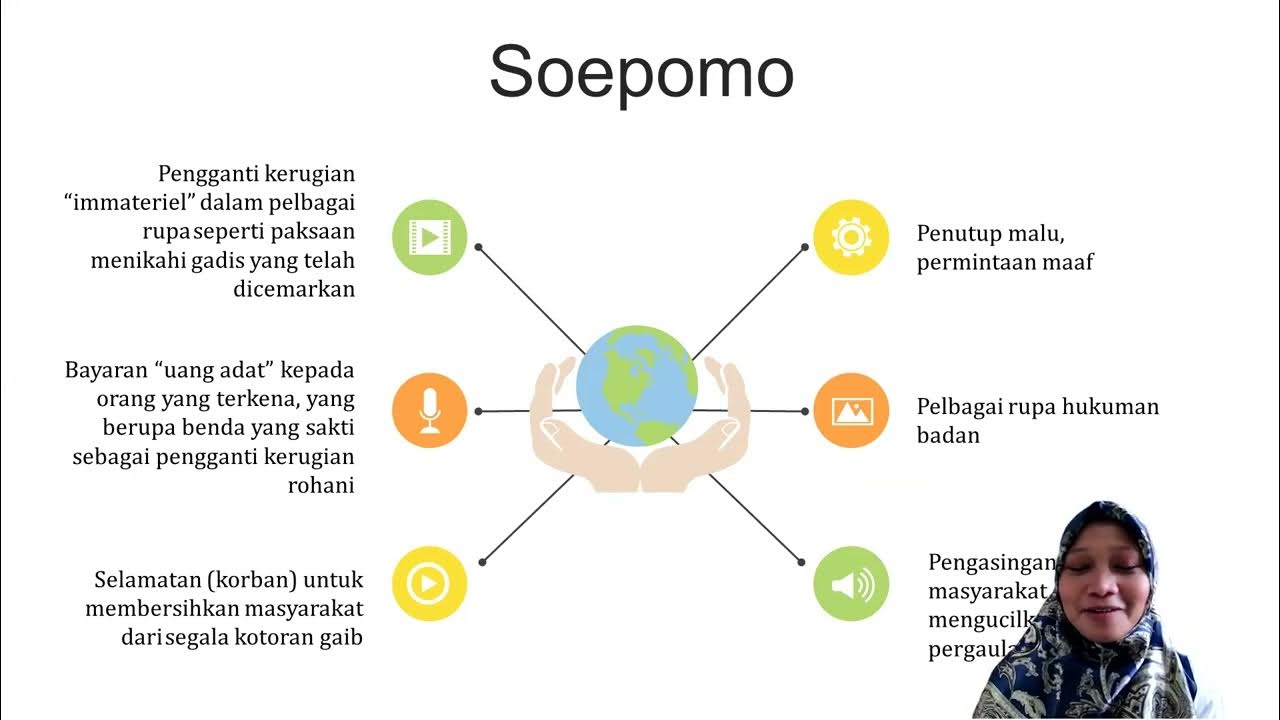Hukum Adat 03 | Ciri Ciri Hukum Adat #hukumadat
Summary
TLDRThis tutorial video explores the unique characteristics of customary law in Indonesia. It highlights its magical-religious, communal, concrete, traditional, dynamic, open, simple, and consensus-based nature. The video explains how customary law intertwines with religious beliefs and community values, shaping practices like mutual cooperation, family ties, and harmony in resolving disputes. The system contrasts with Western legal systems by not distinguishing between public and private law, or between civil and criminal offenses. The video also discusses how Indonesian customary law has evolved and coexists with modern legal systems, offering a comprehensive understanding for students and legal enthusiasts.
Takeaways
- 😀 Hukum adat in Indonesia has unique characteristics that differentiate it from other legal systems.
- 😀 The four main features of adat law are: magico-religious, communal, concrete-visual, and traditional.
- 😀 Magico-religious features of adat law reflect the belief in sacred and supernatural forces, influencing legal decisions and behaviors.
- 😀 Adat law emphasizes communal values, where the individual's interests are subordinated to the welfare of the community.
- 😀 Concrete-visual characteristics of adat law mean that legal actions are tangible and visible, such as the transfer of goods in transactions.
- 😀 Traditional elements of adat law are passed down from ancestors, and violations are believed to bring misfortune or harm to the community.
- 😀 Adat law is dynamic, adapting to changes over time and incorporating other legal systems when deemed appropriate by the community.
- 😀 The simplicity of adat law makes it accessible and understandable, with informal, often oral agreements governing transactions.
- 😀 Disputes in adat law are resolved through consensus, using negotiation and mutual agreement, rather than adversarial litigation.
- 😀 Indonesian adat law is influenced by cultural traditions and emphasizes social harmony, contrasting with more formal, written legal systems like Western law.
Q & A
What are the four general characteristics of customary law in Indonesia as described by F.D. Holeman?
-The four general characteristics of customary law in Indonesia are: (1) magical-religious, (2) communal, (3) concrete-visual, and (4) traditional.
How does the magical-religious characteristic manifest in customary law?
-The magical-religious characteristic is based on societal beliefs in the sacred, where before the introduction of religion, people believed in animism and supernatural forces, and after recognizing religion, it evolved into a belief in divine rewards and punishments.
What is meant by the communal aspect of customary law?
-The communal aspect emphasizes the importance of community over the individual. It reflects a collective spirit where personal interests are always aligned with the interests of the society, focusing on mutual cooperation and solidarity.
What does the concrete-visual characteristic of customary law entail?
-The concrete-visual characteristic means that customary law actions are clear, tangible, and visible. For instance, transactions like buying and selling are shown through physical actions like the transfer of goods.
What role does tradition play in customary law?
-Tradition in customary law signifies practices passed down from ancestors. These traditions are deeply respected and maintained by communities, and violations of these norms are believed to bring misfortune.
Can customary law change over time?
-Yes, customary law is dynamic and can evolve based on changing societal conditions and contexts. It adapts to new circumstances while retaining its cultural roots.
What is meant by customary law being 'open'?
-Customary law is open in the sense that it can accept and integrate other legal systems if the community believes they are compatible or beneficial, demonstrating flexibility in accommodating new influences.
How is customary law generally applied in Indonesia compared to Western legal systems?
-Unlike Western legal systems that distinguish between public and private law, customary law in Indonesia does not make this distinction. It is applied more holistically, where both civil and criminal violations are addressed by the same authority, such as a village head or customary leader.
What are the key features of customary law compared to modern legal systems?
-Customary law is more straightforward, often oral, based on mutual trust, and focused on communal resolutions like consensus through deliberation. In contrast, modern legal systems tend to be more formal, written, and bureaucratic.
How does customary law handle conflict resolution?
-Conflict resolution in customary law is typically done through consensus and discussion, with an emphasis on maintaining harmonious relationships and resolving disputes amicably through community dialogue.
Outlines

This section is available to paid users only. Please upgrade to access this part.
Upgrade NowMindmap

This section is available to paid users only. Please upgrade to access this part.
Upgrade NowKeywords

This section is available to paid users only. Please upgrade to access this part.
Upgrade NowHighlights

This section is available to paid users only. Please upgrade to access this part.
Upgrade NowTranscripts

This section is available to paid users only. Please upgrade to access this part.
Upgrade Now5.0 / 5 (0 votes)





